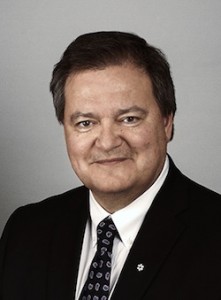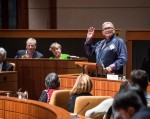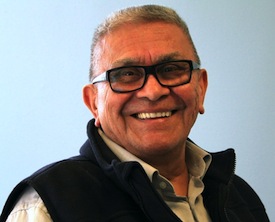Dr. Mary Ellen Turpel-Lafond speaks at the fourth session of “How to Love a Child,” the Janusz Korczak Lecture Series. (photo by Cynthia Ramsay)
“Rights are paper tigers, just pieces of paper, unless there are people courageous enough to defend them, and unless there are mechanisms to enforce them and compel them. The child who has a right to be heard but no one listens to, and disappears without ever being heard, never really had a right to be heard,” warned B.C. representative for children and youth Dr. Mary Ellen Turpel-Lafond at the fourth session of “How to Love a Child,” the Janusz Korczak Lecture Series.
The Jan. 21 lecture at the University of British Columbia, which is part of a six-part series co-organized by the Janusz Korczak Association of Canada and UBC’s faculty of education, focused on The Human Rights of Aboriginal Children. Also speaking was Dr. Mike DeGagné, president and vice-chancellor of Nipissing University, who was the executive director of the Aboriginal Healing Foundation (AHF), which was established in 1998 with a grant from the federal government and wound down its work in 2014. Its mandate was “to encourage and support, through research and funding contributions, community-based aboriginal-directed healing initiatives which address the legacy of physical and sexual abuse suffered in Canada’s Indian residential school system, including inter-generational impacts.”
Dr. Grant Charles, associate professor at UBC School of Social Work, acted as moderator, and Janusz Korczak Association president Jerry Nussbaum also spoke, explaining briefly who was Janusz Korczak. The educator, writer and orphanage director – after whose book How to Love a Child the lecture series is named – not only wrote about his theories, but lived and died by them. When the Nazis created the Warsaw Ghetto in 1940, Korczak’s orphanage was forced to move there, and Korczak went with the children. In 1942, he and the almost 200 children in his care were taken to Treblinka, where they were murdered.
Nussbaum reminded the audience of Korzak’s philosophies on the rights of children and their direct influence on the content of the United Nations Convention on the Rights of the Child. Korczak believed that every child has a right to love, said Nussbaum, and that “children offered love and care will reciprocate with love and care.” Children have a right to be taken seriously, to education, to protest an injustice, among other rights. Nussbaum explained that Korczak believed that the health of a society could be gauged by the health of its children.
Despite protection under the UN convention, there are many children and youth who are marginalized and, in Canada, First Nations children are among those who are the most at risk. Dr. Jo-Ann Archibald, associate dean for indigenous education at UBC, gave an example of one of the research programs at the university’s faculty of education that is trying to ameliorate this situation. Called Awakening the Spirit, “it’s about revitalizing canoeing at Musqueam,” she explained. There is cooperation among different faculties and some students are involved, “but the most important part is the Musqueam communities that partner in this research. They are the ones who determined this particular project because they felt that they wanted to have something positive in their community for the young people, for the youth.”
Canoeing, she said, was a very important part of the community lifestyle, “it was a way to build family and community cohesiveness and also have fun and learn about the environment at the same time.”
The benefits of the research project, she said, “will be realized in educational materials, in the way of revitalizing important values, the Musqueam language, ensuring we have intergenerational learning.”

DeGagné has had 20 years of experience working with the repercussions of residential schools. He said his views about rights, “especially indigenous children’s rights, I color it with the history of residential schools.”
Often when there is a conversation within the community about indigenous issues, he said, it begins with the high rates of suicide, poverty, over-representation in the justice and child welfare systems, “the rosary of our grievances.” Given that indigenous children have rights, yet the grievances continue, he asked, “How can we be sure those rights are being supported and upheld?”
When AHF began, he said, grant applicants would ask, for example, whether the foundation had an approved list of elders that they could use. “We were astonished. Can you imagine in your own community … in your own spiritual context, asking if your priest was OK, if your rabbi was OK? This is the making of the colonial mind. After years of being subjected to doing it someone else’s way, even when we came along, we could not engender people doing it their way.” He described this as “a learned helplessness,” and a lack of trust in their own culture.
To move forward, it is important to talk of the past, he said. He used the metaphor of a pebble being dropped into a pond to describe the effects of the residential school system. The child’s abuse at the hands of an adult is at the centre, it is the pebble being dropped; the next ripple out is one child at a residential school abusing another child (“learned behavior”); the next is when that person leaves the school and returns to their community and starts a family in which violence takes place; then the violence between that family and another in the community. As we look at the outcome, standing on the outside, we see the high rates of suicide, family violence, neglected children, but we, as observers, “can’t see anything but the dysfunction and so infrequently do we get to examine what happened in the middle, what happened in that first instance of violence, what happened when that child’s human rights” were disregarded. “This is why we talk about history,” this is why 100 years of residential schools is important, he said.
To change the situation, he pointed to two necessities: the establishment of fairness, “the money that we spend on First Nations child welfare should be equal to the money that we spend in the rest of the population’s child welfare systems”; and transference of control to First Nations peoples of their lives, agendas and resources.
DeGagné commended the Truth and Reconciliation Commission on capturing the hearts and minds of Canadians and drawing them to indigenous issues, and for talking about system reform as opposed to tweaking or just adding money to a dysfunctional system. But, among his criticisms of the commission’s recommendations is that they do not make him uncomfortable. “It turns out that, in the reconciliation between you and me, indigenous people and non-indigenous people, that 93 of the 94 recommendations require that you do something…. I’d like to feel a lot more uncomfortable reading these recommendations because reconciliation is going to require that I work and that you work, and not that you come to stand by me, but that somehow I come to stand in the middle with you. And so, I think, too often with these recommendations, and this could be a reflection of the colonized mind, we are calling upon someone else to fix the problems with our community. That’s a concern of mine.”
The TRC, he added, also describes issues as if there has been no progress in the last 20 years – by the churches, universities, governments and others – towards reconciliation. “We have much to do, but we have to start by acknowledging the good work of all us and how much progress we’ve made.”
Turpel-Lafond spoke about how long it takes to change systems. “You have to really make that investment [in change], and it takes time,” she said.
AHF “laid the groundwork for thinking about healing” and the view of storytelling and its importance in healing, she said. “Stories, particularly the stories of grievances that aboriginal adults have – and many of our parents and grandparents have – are stories that needed to be told, that needed to be heard, that needed to be listened to.” AHF “gave resources for people to validate that process of allowing individuals who had been through residential school, their personal experience and their collective experience, to be told and listened to in a very sincere way in which they were supported, but also could create that medicine toward healing.”
Turpel-Lafond’s great-great-grandparents were the first two students at St. Michael’s Indian Residential School in Duck Lake, Sask. She spoke of the difficulties in sharing some of the stories with her own children. “Children are not always ready to hear those stories. I’m not trying to be over-protective, but we need to think about children’s well-being … how we tell the stories to children, when we tell stories to children, and how we can put those stories in a context.”
She then went on to speak about Korczak and the lecture theme, “How to love a child.” For her, Korczak represents what it means to love children, even “where it was extremely unpopular to love and support some children, who were considered to be less worthy, who were considered to be disposable…. And also to bring forward the idea that love is a kind of medicine with respect to our society…. We express our love for our own society and its furtherance by how we love our children because we create a vision of something we may not even be here to enjoy, that we create through that very values-based process.”
We’re not talking about creating the perfect system or bureaucracy, she said, noting that Treblinka was an attempt at a perfect system, “we’re talking about values.”
The love that Korczak represents for her in the context of indigenous children is an approach that does not come from a perspective of shaming, blaming, contempt or judgment. This is “a really serious problem that we continue to have for the current generation of indigenous children, which is, we want to save them but we still want to blame their parents, and that’s a very unhealthy attitude.” We need to come “from a perspective of love and understanding and context, and seeing … [how] multiple shocks … can just devastate families, not every family, but some families.”
A second lesson she takes from Korzcak’s views is “the idea that nobody owns your story, that you have to have the courage to say it.” People may relate to your story in various ways, “but the story, and telling it, the courage to do that, to talk about the difficult things, is a very important instinct related to love and, if you can’t bring that out and you don’t have enough people in your society who are courageous, then your society is doomed. And how do you build courageous people? … [I]t’s about love and acceptance and space, but it’s also about having very strong adults to allow people like kids to tell stories.” Korczak “represented that right to be heard,” she said, and he went even further, going against the mores of the day in that he wanted “no corporal punishment of children.”
She said that many indigenous children have been “raised in an environment deprived of the type of unconditional love, culture, language and the right to know who they were and where they were…. If you love people and you’re prepared to understand that grievance and suffering is not permanent, it can be redressed.”
But, adults who love children must see something in the children that the children may not see themselves because they’re mired in rejection. “There have to be positive, healthy adults who see their potential and support them to get to their potential. That’s a very important concept because, not surprisingly, guess what, some of the children who have been most abused and ill-treated can be the most challenging to engage with in terms of their emotional regulation, in terms of their contact with adults, in terms of their anger.”
The government label is that these children are “service resistant,” she said, which means, “we will leave you alone because you’re too angry for me even to listen to your story. But, if you take a page from Andrew Solomon [author of Far from the Tree: Parents, Children, and the Search for Identity] and Janusz Korczak, what would you say? I am able to rise above it and listen to this story and, if I’m a good, healthy adult that’s coming from a place of love, I can probably see what’s in the story and see how it can be a medicine for the future.”
The third lesson she takes from Korczak, her experience as an indigenous person and as an advocate for children is that “rights are an important medicine.” Rights are so important because “rights are a way to reframe incredible vulnerability and systematic disempowering … into a different context that overnight takes, for instance, that residential school experience and now makes it appalling, completely unacceptable, who would ever do that to children? Because they have a right to learn, they have a right to be safe, they have a right to be heard, they have a right to their language, [to their] culture transmitted from their parents to them, and there’s nothing threatening or harmful about that.”
In British Columbia, we have a long way to go. Of the children in care, more than 60% are indigenous children. While Turpel-Lafond said we are in a better place as a society than when she left home and went out in the world, “we are not in a place where indigenous children can in any way be guaranteed equal opportunities with other children in British Columbia. By accident of birth, they’re going to be born with significant disadvantages that will only be overcome based on what we decide to do.”
In the half-hour question and answer period that followed, one of the listeners shared her story of how her child had been abused by foster parents and, when she tried to remedy the situation, she could not find help, no matter to whom or to which government office she turned. Turpel-Lafond was at a loss to respond, other than to empathize and say we don’t have the answers, “but we’ve got to find a way to get them.”
The fifth lecture in the Korczak series takes place on Feb. 18, 7 p.m., and focuses on the topic Social Pediatrics in Canada and Vancouver. The final lecture on April 6 provides a summary of the series. To register and for more information, visit jklectures.educ.ubc.ca.



